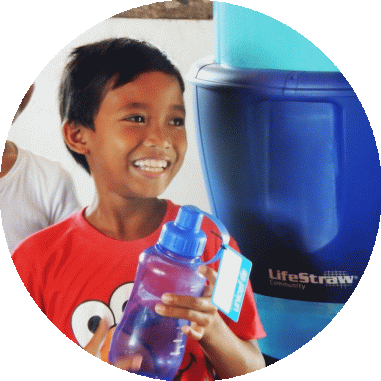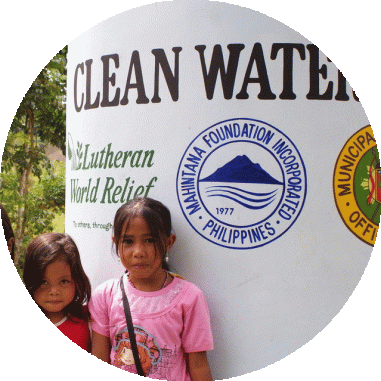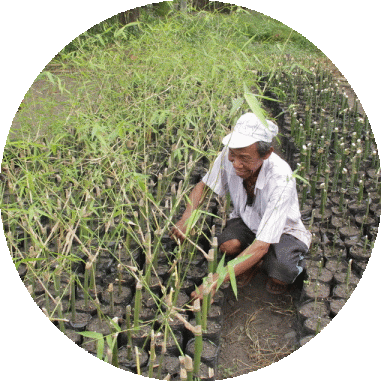As part of the Typhoon Haiyan Response, Lutheran World Relief helped local governments and community- based organizations to access safe drinking water and improved sanitation through the distribution of 240 community water filtration units to child-centered spaces. We also addressed the loss of sanitation facilities and hygiene supplies, as well as gaps in services, through a community-led sanitation solutions project that reached nearly 11,000 people.
“When the well's dry, we know the worth of water,” wrote Benjamin Franklin in his Poor Richard’s Almanac.
People living in rural communities in the developing world know the hard truth of this aphorism because they often cannot access enough water, or because the water they consume is of poor quality, causing life-threatening disease. Inadequate access to safe drinking water threatens the well-being of more than 1 billion people around the world, and more than twice that number have no adequate sanitation.
Helping communities to access to adequate clean water is an essential component in Lutheran World Relief’s work with farmers, as well as our response to emergencies and disasters. Our climate smart agriculture approach promotes water conservation and effective watershed management to create healthier landscapes that are more resistant to droughts and floods.
“Ensuring that communities have stable sources of water is critical to their long-term resilience,” says Femia T. Baldeo, Lutheran World Relief’s country director for the Philippines.
Water in Agriculture
Ensuring an adequate supply of water is key to successful agricultural production, particularly in drought-prone areas. Lutheran World Relief employs water-harvesting and conservation techniques such as rainwater capture and terraces to direct water straight to the crop. For example, creating zai pits — shallow holes that are about 2 feet wide by 2 feet long and 2 feet deep with a mound of dirt on three sides to direct rainwater into the pit — are effective for concentrating nutrients and water on a crop’s roots.
Lutheran World Relief also employs agroforestry techniques that promote biodiversity, combining agricultural crops with the planting of hardwood fruit and other types of trees to reduce soil erosion while enhancing soil organic matter. Encouraging sustainable agricultural practices such as the use of organic fertilizers reduces pollution from runoff. In coffee-producing regions, Lutheran World Relief introduces innovative post-harvest technologies like ecological wet mill processors that reduce water use and contamination of streams and rivers by up to 80 percent.

Water in Emergencies
Access to clean water may be the most important and immediate need in the wake of an emergency.
Lutheran World Relief delivers supplies of water in emergencies to affected areas, while also installing or rehabilitating storage tanks and reservoirs. Where water is scarce or unsafe, Lutheran World Relief drills and decontaminates wells, installs hand-pumps, protects natural springs, taps aquifers, rehabilitates damaged infrastructure, and pipes water into hard-to-reach villages and health centers.
Water and Sanitation
Lutheran World Relief’s Water and Sanitation (WASH) projects integrate sustainable and local innovations to meet the needs of the most vulnerable people. Our work utilizes a public health approach to water during emergency responses, as well as a holistic, adaptable and sustainable water resource management approach for long-term development.
Lutheran World Relief works closely with local governments to increase access to WASH facilities, helping them to develop business plans and financial projections, design low-cost WASH facilities, implement community education programs, and craft local ordinances to support these activities.
Case studies: Water & sanitation in the Philippines
-
Addressing water and sanitation after Typhoon Haiyan
- Installing water systems
- Reducing flood threat through disaster risk reduction
- Installing water systems


The Osprey Foundation-funded Women-Managed Potable Water System project in the Philippines installed women-managed water system facilities in five barangays (villages), giving potable water access to 734 households. The project built the capacity of women’s organizations to successfully manage the water systems and advocate with the government for improved water management.

Stable water sources are critical to the long-term resilience of communities. Lutheran World Relief's Reduced Vulnerability by Introducing Viable Economies (ReVIVE) project worked through local partner Mahintana Foundation, Inc. (MFI) to reduce the impact of flooding within farmlands by gradually rehabilitating and protecting the Silway-Klinan River and its tributaries and gullies through measures such as planting fruit trees and bamboo.


